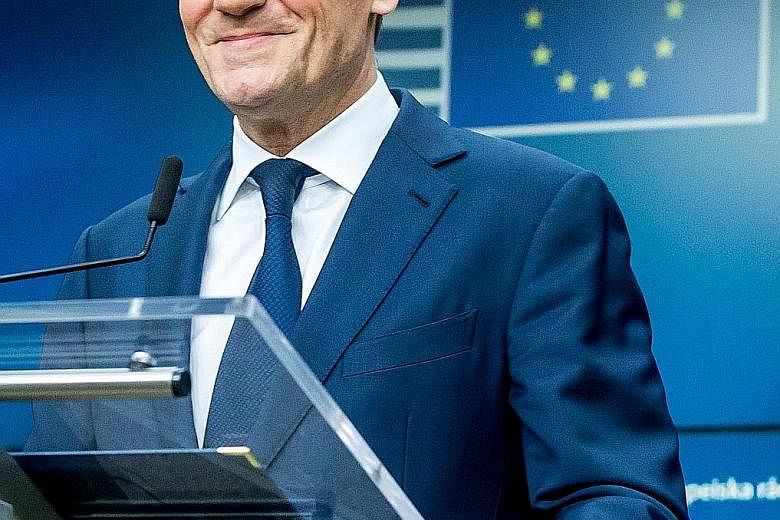BRUSSELS • Mr Donald Tusk has been appointed to a second term as president of the European Council, one of the European Union's governing bodies, despite objections from the government of his own country, Poland, that led to an unprecedented confrontation in Brussels.
Poland was overruled by leaders of the 27 other EU member countries as they gathered for their spring summit meeting.
It was the first time such a decision was made without unanimity since the job was created in 2009.
The council sets the leaders' agenda, and Mr Tusk will be expected to forge compromise among its fractious membership during a 21/2-year term, during which the countries will debate and possibly decide, whether the European Union survives in its current form.
Mr Tusk, 59, was a driving force in last year's deal with Turkey to address the migration crisis, and he has coordinated the EU's response to Britain's plan to withdraw.
"He's decent, he's effective, he's a very good president," Prime Minister Mark Rutte of the Netherlands said on Thursday.
The right-wing government that took power in Poland in 2015 wanted Mr Tusk out of the job, and it had even suggested - without evidence - that he betrayed his country.
President of Lithuania Dalia Grybauskaite told reporters that EU leaders should not be "hostages of national politics inside Poland."
There had been speculation that Prime Minister Viktor Orban of Hungary, also a right-winger, could support Ms Beata Szydlo, the Polish Prime Minister.
That hope fell away on Thursday when Mr Orban, arriving at the summit meeting, indicated he would not oppose the choice of Mr Tusk.
The meeting was the first time the leaders gathered inside an orb-like structure at their new headquarters, called Europa, which is expected to cost more than €320 million (S$481 million).
A key goal for European leaders is quelling speculation that Britain's expected departure may be the start of a great unravelling of the European Union, amid an upsurge of populism.
Faced with United States President Donald Trump's "America first" economic policy and a resurgent anti-globalisation tilt in their own backyards, the EU chiefs used their last full meeting before Dutch and French elections to express their commitment to free trade and open commerce, pointing specifically to deals with Asian nations.
"Europe remains the champion of open, rules-based trade. Not least due to signs of protectionism emerging elsewhere," said the newly re-elected Mr Tusk.
"Trade is central to our economic success and so we will swiftly advance ongoing negotiations, such as with Japan."
Separately, German Chancellor Angela Merkel indicated to reporters that she would seek to accelerate talks with the Mercosur states, push to renew the trade accord with Mexico and wanted to open a new chapter with China.
REUTERS, BLOOMBERG

